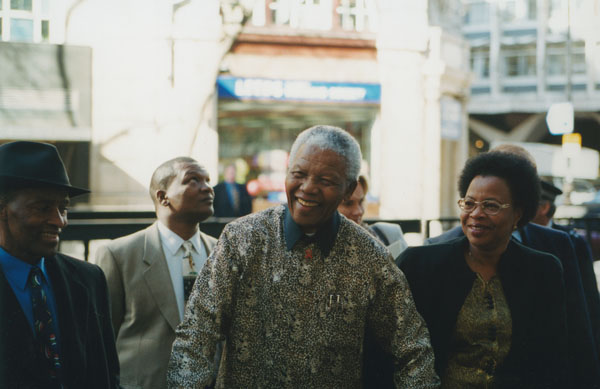You can change the political conversation. Chip in to rabble’s donation drive today!
Renowned activist and global statesman Nelson Mandela, who died last week at the age of 95, was imprisoned in South Africa for 27 years for his role in the struggle “for a democratic and free society, in which all persons will live together in harmony and with equal opportunities,” as he said at his trial. After his release in 1990, he became leader of the African National Congress (ANC) and helped negotiate an end to apartheid, a system of brutally enforced racial segregation, before serving as the country’s president from 1994 to 1999.
Though behind bars for much of his adult life, his disciplined struggle provided great strength and resolve for millions of South Africans who lived daily through the indignities of apartheid: forced separation of communities on the basis of race, banning of opposition newspapers and political gatherings, mass arrests and even torture and extrajudicial murders of loved ones who stood in opposition to the government’s racist policies.
That he emerged from incarceration without bitterness toward his captors to negotiate a peaceful end to apartheid and the enfranchisement of all South Africans, regardless of race or creed, was indicative of his remarkable personal drive to seek unity, healing and reconciliation.
These personal attributes of true leadership and compassion helped Mandela inspire the largest people-power movement in history. Millions of people around the world became aware of the anti-apartheid struggle and offered support with marches, strikes, peaceful civil disobedience, boycott campaigns and other tactics.
In Canada, Prime Minister Brian Mulroney’s Conservative government played a crucial role on the world stage by maintaining stiff economic sanctions against South Africa’s government, despite pressure from Britain and the United States, which benefited from significant economic ties to that country’s resource and weapons sectors.
Perhaps more remarkable was the degree of support offered by ordinary Canadians toward the small community of South African activists, like my own family, who found refuge in Canada during the darkest days of apartheid. Support and solidarity came from all quarters, but especially Canadian trade unions, churches and people on university campuses across the country.
One example of support was the creation of the Solomon Mhalangu Freedom College, a bush school established by my father and his colleagues in the ANC with help from Canadian unions and the teachers and students of a local high school in Toronto, where he taught. Named after a young ANC activist who was imprisoned and later executed by the South African government, Solomon Mhalangu Freedom College provided both a place of refuge and learning for thousands of South African youth who escaped the country after the Soweto massacre in 1976. Upon the end of apartheid, the ANC handed the school over to the Tanzanian government, where it is now a thriving university for local communities.
Mandela was a true internationalist who used his influence as an elder statesman to speak out in support of human rights and self-determination of oppressed peoples around the world. His death reminds us that we need to carry forward the struggle against injustice wherever it is found, including here in Canada where close to half of all aboriginal children live below the poverty line, and the dream of reconciliation with indigenous peoples remains unrealized as long as governments refuse to honour treaties and international agreements to protect indigenous rights.
In 2001, the Canadian government made Nelson Mandela a citizen to honour his lifetime of sacrifice in the struggle against apartheid. A far greater way to honour this great statesman is for Canadians to once again stand in the service of what is right and just, as we once did in helping to end apartheid, and fight for healing and reconciliation with Canada’s Aboriginal Peoples.
The rallying cry of the liberation movement that Mandela successfully led was “Amandla Ngawethu,” Zulu for “Power to the People!”
Canada’s Aboriginal Peoples have little power today. They struggle under crushing poverty, abysmal housing conditions and racism here at home. The true enfranchisement of Canada’s First Peoples would be a fitting and enduring testament to the example set by Mandela for the global community of nations.
Like this article? Chip in to keep stories like these coming!
Faisal Moola is the Director-General for Ontario and Northern Canada of the David Suzuki Foundation. His parents were anti-apartheid activists in South Africa and members of Nelson Mandela’s African National Congress movement.
This article originally appeared on The Toronto Star and is reprinted with permission from the author.
photo: wikimedia commons




